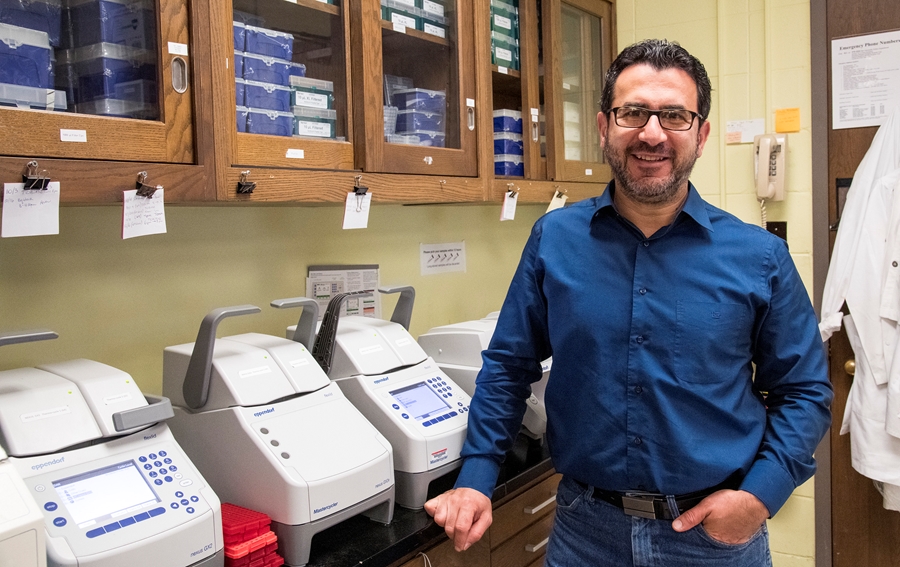
Ioannis E. Tzanetakis, professor of plant pathology for the U of A System Division of Agriculture, has received a fellowship from the Greek Diaspora Fellowship Program to work with the Agricultural University of Athens, Greece, on research to identify and describe viruses and viroids that affect fig crops.
Tzanetakis joined the Arkansas Agricultural Experiment Station, the research arm of the Division of Agriculture, as a plant virologist in 2008. He uses the latest gene sequencing and bioinformatics tools to identify and understand plant viromes, the virus communities in plants.
He is also a professor in the Department of Entomology and Plant Pathology for the Division of Agriculture and the Dale Bumpers College of Agricultural, Food and Life Sciences.
While in Greece this coming summer, Tzanetakis will collaborate with Prof. Andreas Voloudakis of the Agricultural University of Athens to design, equip and establish a pipeline to ensure the health of fig propagation material.
Tzanetakis is an alumnus of the Agricultural University of Athens, earning his bachelor's and master's degrees there before pursuing his Ph.D. at Oregon State University.
"The Agricultural University has an established gene bank of fig trees," Tzanetakis said. "We will be working together with Prof. Voloudakis to test the trees for viruses and viroids and develop a pipeline to ensure the health status of the propagation material distributed to producers."
Viroids are infectious pathogens smaller than a virus and consisting only of nucleic acid without a protein coat.
The plan is to process 60 or so fig cultivars using high throughput sequencing, identify the varieties that are free of viruses and viroids of concern, and move that material through the nursery system, Tzanetakis said.
Tzanetakis established a plant virology lab at the Arkansas Agricultural Experiment Station where he uses those tools to study the viromes of berries, ornamentals and soybeans and has taken the lead in efforts to unify the certification rules for berry crops across the United States. (For more information visit https://www.ncpnberries.org/state-certification). The goal of his GDFP project is to share that expertise, serving in an advisory role to help Agricultural University of Athens to establish similar pipelines for fig in Greece.
The Agricultural University of Athens project is one of 37 projects that will pair 38 members of the Greek and Cypriot academic diaspora with higher education institutions and collaborators in Greece to work together on curriculum co-development, collaborative research, graduate and undergraduate research training and mentoring activities in the coming months.
The GDFP, now in its third year, is designed to enable brain circulation between Greek universities and universities abroad, strengthen capacity at the host institutions and develop long-term, mutually beneficial collaborations. It is funded by the Stavros Niarchos Foundation and managed by the Institute of International Education in collaboration with the Fulbright Foundation in Greece. A total of 87 Fellowships have been awarded since the program's inception.
Fellowships match host universities with scholars and cover the expenses for project visits of between 14 and 90 days. A complete list of projects can be found here.
Please direct all questions related to the application process to GreekDiaspora@iie.org.
To learn more about Division of Agriculture research, visit the Arkansas Agricultural Experiment Station website: https://aaes.uark.edu. Follow us on Twitter at @ArkAgResearch and Instagram at ArkAgResearch.
About the Division of Agriculture
The University of Arkansas System Division of Agriculture's mission is to strengthen agriculture, communities and families by connecting trusted research to the adoption of best practices. Through the Agricultural Experiment Station and the Cooperative Extension Service, the Division of Agriculture conducts research and extension work within the nation's historic land grant education system.
The Division of Agriculture is one of 20 entities within the University of Arkansas System. It has offices in all 75 counties in Arkansas and faculty on five system campuses.
The University of Arkansas System Division of Agriculture offers all its Extension and Research programs and services without regard to race, color, sex, gender identity, sexual orientation, national origin, religion, age, disability, marital or veteran status, genetic information, or any other legally protected status, and is an Affirmative Action/Equal Opportunity Employer.
Topics
Contacts
Fred L. Miller, Science Editor
Agricultural Communication Services
479-575-4732, fmiller@uark.edu